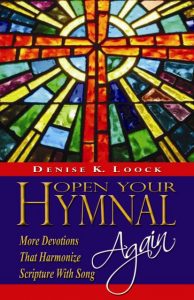 My guest today is editor and author Denise Loock. Denise shares with us what a writer should never say to an editor. At the end of her post, you’ll find more information about her editing services and devotional books.
My guest today is editor and author Denise Loock. Denise shares with us what a writer should never say to an editor. At the end of her post, you’ll find more information about her editing services and devotional books.
Denise: Hiring an editor is wise. But you’ll waste the money you’ve invested if you’re unwilling to accept an editor’s advice. Here are ten things you may want to say to an editor but shouldn’t.
1. No one will notice. No one cares. If you’ve ever noticed a misspelled word or a misplaced comma in a newspaper or on a billboard, you care about accuracy. More than that, though, God cares. He loves excellence. In fact, He demands excellence. Colossians 3:23-25 says, “Don’t just do the minimum that will get you by. Do your best. Work from the heart for your real Master, for God. … The sullen servant who does shoddy work will be held responsible. Being a follower of Jesus doesn’t cover up bad work” (MSG). Ouch. God never excuses “shoddy work.”
2. My friend, an English teacher, told me this was correct. I taught English for 29 years before I became an editor. The differences between English-teacher style and publication style are many. Get the right resources. Here are three: The Christian Writer’s Manual of Style, fourth edition (CWMS); Proofreading Secrets of Best-Selling Authors; The Associated Press Stylebook.
3. How will readers get my point if I don’t use italics, all-caps, and exclamation points? Make your words work. Don’t glitz them up with fancy fonts and superfluous punctuation. “The craft of writing involves arranging words and phrases in such a way as to emphasize the important points without depending on typographic peculiarities” (CWMS 77). “Typographic peculiarities” attempt to mask mediocrity with gaudiness. Don’t insult your reader with such shenanigans.
4. Max Lucado does it that way. According to his website, Lucado has sold 92 million books. Yes, he’s successful. But if God wanted another Max Lucado, He would clone him. Be your best self. Find your voice.
5. This is God’s message. I can’t change it. Yes, the Holy Spirit impresses on us a message. He reveals fresh meanings and applications in Scripture. But He also uses traditional means of education. Paul’s letters are filled with post-resurrection connections to Old Testament Scriptures. Revealed by the Holy Spirit, yes. But Paul had studied the Hebrew Scriptures thoroughly. He learned under Gamaliel, the most respected rabbi of that era (Acts 5:34; 22:3). Messages need refinement. So do messengers. Just ask Paul.
6. That’s the way I talk (or blog.) The CWMS devotes three pages to the difference between blog style and book style. It covers topics such as tone, structure, transitions, repetition, and references. Learn the rules of good writing and practice them in everything you write.
7. I like it the way it is. Stubbornness is the twin of arrogance. Everyone makes mistakes—writers and editors. But wait at least 24 hours before insisting, “I won’t change it.” Pray about it. In The Canterbury Tales, Geoffrey Chaucer says of the student: “And gladly would he learn and gladly teach.” That’s my goal as both a writer and an editor.
8. But I love that song (book, speaker). We all have favorite books, speakers, and songs. But that doesn’t mean we insert lyrics, paragraphs, and illustrations from those sources in our books or blogs. Find a fresher way to say it that reflects your experiences, your environment, and your interests.
9. I saw it somewhere on the Internet (heard it at church, at a conference, on TV). Documentation is essential. If you don’t know the source, don’t use it. Misquotes and wrong attributions permeate the Internet. Avoid using brainyquote.com and goodreads.com/quotes. And never depend on Wikipedia. Respect the sources you admire enough to read the original version of their words.
10. It could mean that, couldn’t it? Use Scripture accurately and appropriately. Context is everything. Don’t mix fiction with fact. Even if you’re using only one verse, study the context, read a few commentaries, and pray about it. Research Scriptures as thoroughly as other citations. Plant 2 Timothy 2:15 in your heart and “correctly handle the word of truth” (NIV).
Remember, an editor is your friend. Editors want your manuscript to be the best it can be. Editing is a humbling career. Writing is a humbling career. Neither writers nor editors are infallible. But we both can strive for excellence and make our heavenly Father proud.
Thank you for these reminders, Denise.
Ten things a writer should never say to an editor. Click to Tweet.
Which of the ten no-nos do you have trouble with?
 Denise Loock is an editor, writer, and speaker. As a book editor, she uses her twenty-nine years of experience as an English teacher to help Lighthouse Publishing of the Carolinas produce high quality, engaging inspirational fiction and nonfiction books. As a freelance editor, she helps published and unpublished writers create clean, concise, and compelling manuscripts that will attract publishers and intrigue readers.
Denise Loock is an editor, writer, and speaker. As a book editor, she uses her twenty-nine years of experience as an English teacher to help Lighthouse Publishing of the Carolinas produce high quality, engaging inspirational fiction and nonfiction books. As a freelance editor, she helps published and unpublished writers create clean, concise, and compelling manuscripts that will attract publishers and intrigue readers.
Denise also shares with others the joy of studying God’s Word through the website she founded, DigDeeperDevotions.com. She is the author of two devotional books that highlight the scriptural truths of classic hymns and gospel songs, Open Your Hymnal and Open Your Hymnal Again. Contact her at denise@lightningeditingservices.com.










Great article, Denise~thank you for sharing! I especially liked your blog vs book item. It seems that more and more manuscripts crossing my desk read like text messages with choppy, incomplete sentences.
Hi Vie, thanks for your comment. I like how Denise calls for and encourages excellence in writing.
Very good advice! Thanks
Hi Erin, I think if we writers work on even a couple of Denise’s no-nos, we’d step toward excellence.
Zoe, I just sent my manuscript to an editor for the first time. I’ll have to let you know what I liked least! Thanks for all you do to help others.
Yay! A great accomplishment, Sheri.